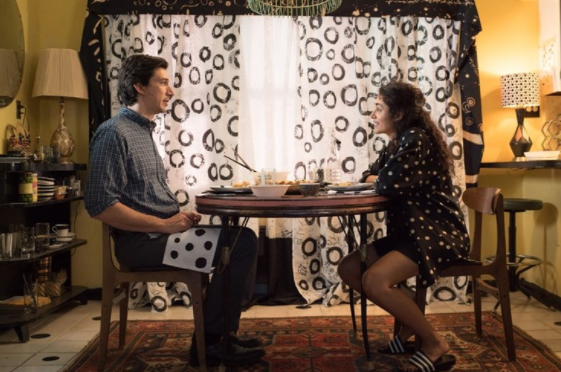For those accustomed to the Jim Jarmusch pace of life, Paterson is a film in keeping with what we’re used to from the indie auteur. However, in this case, Jarmusch’s standard tread is especially appropriate for watching the day-to-day life of Paterson (Adam Driver) unfold with the same monotony and yearning for something more that we ourselves know all too well.
While his wife, Laura (Golshifteh Farahani), stays at home and tends to her own artistic aspirations, Paterson must drive the 23 bus, fitting in time to write his poetry when he can before beginning his route and while on his lunch break. Though Laura often encourages him in his aspirations to write and pursue his dream, there is an underlying sense of resentment that might bubble to the surface at any minute as he’s the one affording her all the time and money for her dreams, which include, but are not limited to, country singer, drape maker and cupcake purveyor. Though this isn’t necessarily the intent of Jarmusch–to make it come across as though Laura is a bloodsucker leaving little room for Paterson to meander in his own aspirations–that’s how it would come across to those seeking a deeper meaning. And yet, because Jarmusch wrote the film with extremely literal poet William Carlos Williams in mind, it’s rather safe to take things as they are in Paterson. The notion for the film came to Jarmusch roughly twenty years ago, when he visited the small enough town in New Jersey to pay respects to one of Williams’ poems, also called “Paterson.” In the epic five-volume homage, Williams writes “and the craft,/subverted by thought, rolling up, let/him beware lest he turn to no more than/the writing of stale poems…/Minds like beds always made up…” These particular lines draw the most parallels to our protagonist’s life, who fears both overthinking while also wanting to imbue his simplistic poems with the utmost of depth.
Surprisingly, the town of Paterson is rather rich in pop culture history, Lou Costello among the highlighted for his birth there, hence the memorial park in his honor. The bar, Shades, that Paterson frequents nightly to delight in the simple pleasure of a beer features a bartender and owner equally as content to do the same thing every day, occasionally asking Paterson for advice on what to include on his Paterson wall of fame. In this scene, Jarmusch, loosely self-references Gimme Danger, released on the heels of Paterson, and name checks Iggy Pop for being voted the sexiest man in the country by a group of Paterson mothers.
As Williams also notes in “Paterson,” there are “no ideas but in things,” meaning that inspiration is best gleaned from the everyday–whether in routine or object form–hence Paterson’s poem about Ohio Blue Tip Matches in which he writes, “We have plenty of matches in our house. We always keep them on hand…” The slow, monotonous process with which he writes down what’s in his head is, at first, somewhat vexing to watch, but later, we come to appreciate the process behind what eventually ends up on the pages of Paterson’s “secret notebook.”
Jarmusch also accents the ample material available to Paterson via the passengers on his bus, particularly two students (played by Kara Hayward and Jared Gilman from Moonrise Kingdom) discussing an anarchist named Gaetano Bresci that lived in Paterson and later returned to Italy to assassinate King Umberto I. It is, again, in this way, that the value of the seemingly humdrum and mundane is iterated. In short, there is always creative incentive in the minutiae.
While Paterson seems perfectly content to write his poems “for him,” it is Laura that implores him to make copies of the pages of his notebook so that he can “share them with the world.” Hesitantly, he agrees to try to make time to go to the “Xerox place” to bring peace of mind to Laura. Unfortunately, he never gets around to it and, on Saturday night, when he and Laura go to a movie theater that only shows old horror films like Island of Lost Souls, their English bulldog, Marvin, seizes the opportunity to tear apart the notebook. When the two return home to see its wreckage, Paterson does his best to appear unaffected.
The next day, a Sunday (the film is shot with a day-by-day structure starting from Monday), Paterson goes for a walk to clear his head and keep his bad mood out of Laura’s way. While sitting on a bench, he encounters a Japanese man who asks him if he’s a poet. Paterson says, “No. I’m just a bus driver.” And in this instant there is a palpable sadness, as it’s the only time Paterson has indicated a sense of wanting to give up on his passion–his dream. But the Japanese man, who has come to Paterson solely to honor his love of William Carlos Williams, isn’t buying Paterson’s line, and offers him one of his blank notebooks, insisting, “Sometimes the most possibility lies in the blank page.” Like the sets of twins he’s been seeing throughout the narrative (Laura had previously told him about a dream she had in which she gave birth to his twins), Paterson takes this as a sign. And so, he goes on. Because, like a love-obsessed bar patron from Shades, Everett (William Jackson Harper), demands, “Without love, what reason is there for anything?” This, of course, also means love of your dream (in addition to your significant other), whether it pans out or not.
Perhaps taking Paterson as a source of encouragement rather than a spotlight on banality, its viewers will learn to appreciate the beauty of sameness rather than treating it as the root of misery. And surely this is a message of Jarmusch’s that William Carlos Williams would appreciate.





















